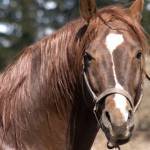Feed to Support the Horse’s Immune System

The foundation of a horse’s nutrition management should be a diet based on high-quality forage and supplemented with grain to provide extra energy for whatever exercise the horse is asked to perform.
In idle and lightly exercised horses, this plan will provide enough nutrients to keep the immune system healthy. However, for many horses, the demands of training, performance, travel, weather, parasites, or even herd dynamics raise the stress level of everyday routines, putting the immune system under pressure. Feeding with an eye to immune system support can help prevent illness for at-risk horses. Nutrients such as protein, selenium, and vitamins A, C, and E are particularly important in helping the horse avoid illness.
Protein is needed to maintain and repair body tissues and also to produce enzymes and antibodies that fight infection. High-quality protein supplies amino acids that the horse is unable to synthesize, so it is particularly important for young horses that are producing, rather than simply maintaining, muscle and connective tissue in addition to disease-fighting components.
Selenium and vitamin E work together to neutralize free radicals and support the production of antibodies. Natural-source vitamin E is absorbed more easily than synthetic forms. While selenium and vitamin E are both important in boosting immune function, each can be detrimental if levels are too high. Oversupplementation with vitamin E can interfere with the body’s absorption of vitamin A, and extreme amounts of selenium are toxic and can lead to a range of problems including lameness and even death.
Vitamin A plays an important role in enhancing the function of white blood cells that are on the front line of immune response. Green plants supply beta carotene, which is used in the horse’s body to produce vitamin A, so simply turning a horse out to graze in a fertile, well-managed pasture with a variety of grasses and legumes is a good start toward maintaining overall health and immunity.
Turnout allows horses to exercise freely and interact with their pasture buddies. For animals designed to move around, eat more or less continuously, and live in a herd, this is the most natural management pattern, and as such it prevents immune-depressing stress caused by hunger, social isolation, and confinement.
Grasses and legumes provide a significant portion of a horse’s requirements for vitamins, minerals, protein, fat, fiber, and fluid. However, because of season or lack of pasture space, many horses spend little or no time grazing. These horses are fed hay, which provides plenty of fiber, but levels of some important nutrients drop quickly after hay is baled.
Owners can be sure they are providing everything necessary to support immune function in their horses by maximizing turnout, feeding the freshest hay possible, and supplementing with a fortified concentrate. For horses that don’t need the calories in sweet feed or a pelleted concentrate, a good choice is a ration balancer. These products contain protein, vitamins, and minerals in a concentrated, low-energy form.








